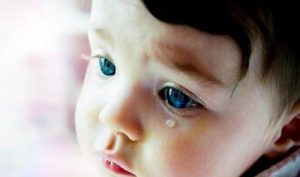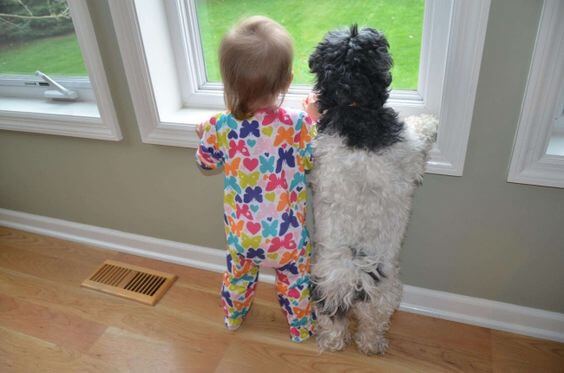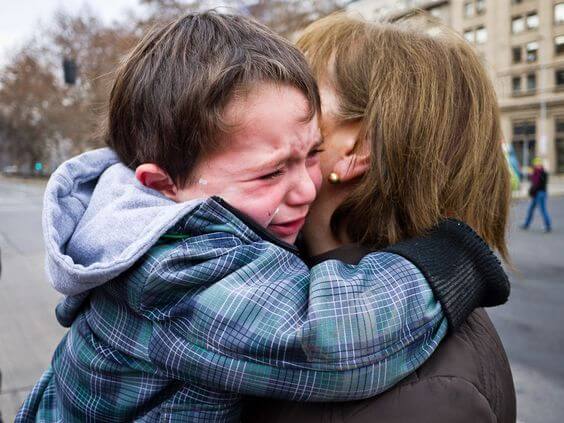Don't Leave The House Without Saying Goodbye To Your Child


Reviewed and approved by the psychologist María Alejandra Castro Arbeláez
Never leave home without saying goodbye to your child. Don’t go through the door thinking that it’s best for your child.
There is no doubt that leaving the house is one of the hardest moments many parents face in the day. It does not matter what the purpose is: shopping, gym, study or work. The moment you have to detach from your little one causes a lot of pain
However, one of the mistakes that parents make is not saying goodbye. This can also leave a long-lasting mark on your child, causing an emotional wound that is deeper than you might imagine.
Take the time, find the strength and a solution that is best for both of you every time you leave your home. Say goodbye to your child, no matter how difficult it is.
Yes, your child may cry, but they will suffer all the same or even more due to your departure without saying goodbye.
The importance of saying goodbye to your child

When you leave your home without saying goodbye to your child, unfortunately you are not preventing any pain. You just stop seeing what happens to them, you also intensify your own hurting. As you can already see, it’s not the best course of action.
You should consider another important detail: When your little one knows you are leaving, they might cry because they are sad. However, when the child does not understand what has happened to the person he loves the most, they cry in complete despair. Clearly they are two very different situations.
Another reason why it is good for you to see goodbye to your children has to do with gaining their trust. If you suddenly disappear without an explanation, you generate distrust. The child may perceive you as someone who cannot be trusted.
Forget the distraction technique and other magic tricks you use to leave the house. Specialists insist that they are counterproductive. These techniques only cause the child to be confused. They will simply start to ask a million questions about whether their mother is coming back or not.
Remember that for a child, separation from their mother is not a minor issue. You are their world, their favorite person, their everything. Don’t turn their universe upside down because all you will do is hurt them.
How to say goodbye to your child properly?

Approach your child and receive them with a kiss and a hug. This whole time maintain a carefree smile.
Explain to them that mommy will be out for a while, and reinforce your safety by pointing out that you will return. The truth is that your child might still cry because it is normal and expected for children to show their feelings.
This farewell ritual should be serene and does not have to last too long. Tell them that they’ll have a great fun day. You should leave out phrases like “I’lll miss you” – these phrases only cause more sadness that will complicate the situation.
If your child starts to cry intensely, do not walk back from the door because every time you try to leave they will cry more intensely. Simply convey calmness to them, tell them that you will call.
Of course if you make the promise to call, you shouldn’t break it for anything in the world. Call them whenever you get a free moment to tell them how much you love them.
This way you don’t prevent your child from missing you, but they will feel more secure every time you leave the house. With this simple goodbye ritual, your child will begin to assimilate you leaving as something temporary.
They will begin to understand that you will come back. Saying goodbye to your child is important because it helps them assimilate the process of separation from you.
Say goodbye in the best way you see fit. Reduce your child’s suffering and reduce your own worrying by doing it correctly. You will start to leave the house with a more peaceful mind as soon as you stop using strategies that try to trick them.
Never leave home without saying goodbye to your child. Don’t go through the door thinking that it’s best for your child.
There is no doubt that leaving the house is one of the hardest moments many parents face in the day. It does not matter what the purpose is: shopping, gym, study or work. The moment you have to detach from your little one causes a lot of pain
However, one of the mistakes that parents make is not saying goodbye. This can also leave a long-lasting mark on your child, causing an emotional wound that is deeper than you might imagine.
Take the time, find the strength and a solution that is best for both of you every time you leave your home. Say goodbye to your child, no matter how difficult it is.
Yes, your child may cry, but they will suffer all the same or even more due to your departure without saying goodbye.
The importance of saying goodbye to your child

When you leave your home without saying goodbye to your child, unfortunately you are not preventing any pain. You just stop seeing what happens to them, you also intensify your own hurting. As you can already see, it’s not the best course of action.
You should consider another important detail: When your little one knows you are leaving, they might cry because they are sad. However, when the child does not understand what has happened to the person he loves the most, they cry in complete despair. Clearly they are two very different situations.
Another reason why it is good for you to see goodbye to your children has to do with gaining their trust. If you suddenly disappear without an explanation, you generate distrust. The child may perceive you as someone who cannot be trusted.
Forget the distraction technique and other magic tricks you use to leave the house. Specialists insist that they are counterproductive. These techniques only cause the child to be confused. They will simply start to ask a million questions about whether their mother is coming back or not.
Remember that for a child, separation from their mother is not a minor issue. You are their world, their favorite person, their everything. Don’t turn their universe upside down because all you will do is hurt them.
How to say goodbye to your child properly?

Approach your child and receive them with a kiss and a hug. This whole time maintain a carefree smile.
Explain to them that mommy will be out for a while, and reinforce your safety by pointing out that you will return. The truth is that your child might still cry because it is normal and expected for children to show their feelings.
This farewell ritual should be serene and does not have to last too long. Tell them that they’ll have a great fun day. You should leave out phrases like “I’lll miss you” – these phrases only cause more sadness that will complicate the situation.
If your child starts to cry intensely, do not walk back from the door because every time you try to leave they will cry more intensely. Simply convey calmness to them, tell them that you will call.
Of course if you make the promise to call, you shouldn’t break it for anything in the world. Call them whenever you get a free moment to tell them how much you love them.
This way you don’t prevent your child from missing you, but they will feel more secure every time you leave the house. With this simple goodbye ritual, your child will begin to assimilate you leaving as something temporary.
They will begin to understand that you will come back. Saying goodbye to your child is important because it helps them assimilate the process of separation from you.
Say goodbye in the best way you see fit. Reduce your child’s suffering and reduce your own worrying by doing it correctly. You will start to leave the house with a more peaceful mind as soon as you stop using strategies that try to trick them.
All cited sources were thoroughly reviewed by our team to ensure their quality, reliability, currency, and validity. The bibliography of this article was considered reliable and of academic or scientific accuracy.
- Bowlby, J. (1986). Vínculos afectivos: formación, desarrollo y pérdida. Madrid: Morata.
- Bowlby, J. (1995). Teoría del apego. Lebovici, Weil-HalpernF.
- Garrido-Rojas, L. (2006). Apego, emoción y regulación emocional. Implicaciones para la salud. Revista latinoamericana de psicología, 38(3), 493-507. https://www.redalyc.org/pdf/805/80538304.pdf
- Marrone, M., Diamond, N., Juri, L., & Bleichmar, H. (2001). La teoría del apego: un enfoque actual. Madrid: Psimática.
- Moneta, M. (2003). El Apego. Aspectos clínicos y psicobiológicos de la díada madre-hijo. Santiago: Cuatro Vientos.
This text is provided for informational purposes only and does not replace consultation with a professional. If in doubt, consult your specialist.








